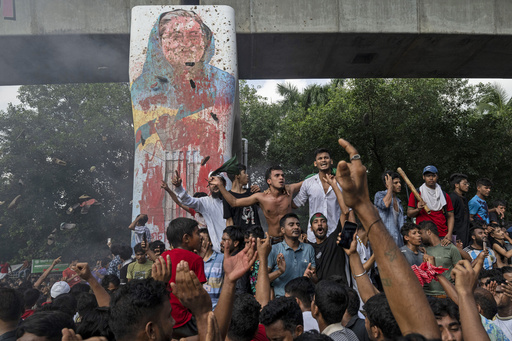Khulna, Bangladesh witnessed a retired auditor, Arobinda Mohalder, feeling fearful for his safety as violence erupted following the resignation of Bangladesh’s longtime Prime Minister, Sheikh Hasina. Mohalder, a member of the Hindu minority in Bangladesh, had to flee his home with his wife after learning about an attack on a fellow Hindu official’s residence in Khulna by an angry mob. The couple’s home was later discovered to have been looted and set on fire.
Since Hasina’s departure, her supporters and associates have been subjected to retaliatory attacks by mobs across the country. Members of the Hindu minority have been particularly vulnerable due to their historical support for the Awami League, seen as a secular party in the Muslim-majority nation, and due to past violence against them during unrest. Reports indicate over 200 attacks on Hindus and other minorities in 52 districts following Hasina’s resignation.
The reasons behind the violence in Bangladesh, affecting its 170 million citizens, are complex and not solely attributed to religious or racial factors. Experts suggest that some attacks on Hindus could be due to their political affiliations with the Awami League, historically considered protective of minorities.
The student-led protests against government job quotas that led to Sheikh Hasina’s resignation escalated into broader unrest against her government. In the aftermath of her exit, mobs engaged in widespread violence, including criminal activities. Authorities of the interim government have condemned these attacks and are collaborating with community leaders to ensure the safety of minorities, including Hindus.
The Hindu community in Bangladesh, constituting 8% of the population, is living in fear and uncertainty following the recent spate of attacks. Memories of past atrocities against Hindus during historical events like the 1971 war of independence and the rise of Islamic groups in the 1990s have resurfaced, intensifying concerns among the minority group.
Reports indicate instances of vandalism, looting of Hindu properties, and damage to temples. However, amidst the lack of comprehensive information and police strikes in the country, concerns about safety and protection persist among the Hindu community. Efforts by volunteers and community members to patrol neighborhoods and maintain vigilance aim to mitigate potential threats and maintain order as the situation unfolds.
The situation has also garnered attention from neighboring countries like India, with Prime Minister Narendra Modi expressing concern over the reported attacks. Misinformation surrounding the violence has further complicated the situation, fuelled by reports from some Indian sources. As the interim government works to address the unrest and investigate the attacks, assurances have been given to protect all citizens and hold perpetrators accountable for their actions.
Despite challenges and uncertainties, the solidarity and resilience of individuals like Mohalder and volunteers like Tahsim Uzzaman reflect a shared commitment to safeguarding communities and promoting peace and security in Bangladesh during these turbulent times.


